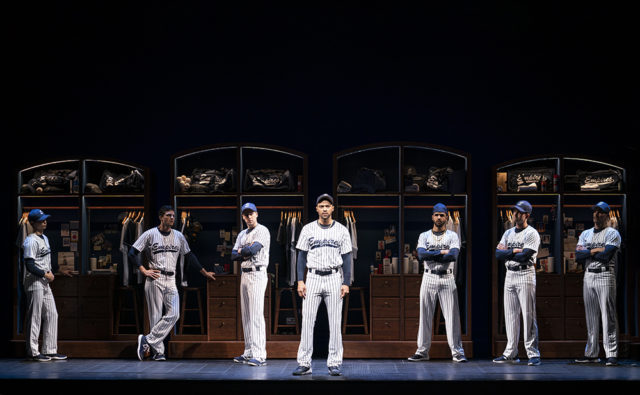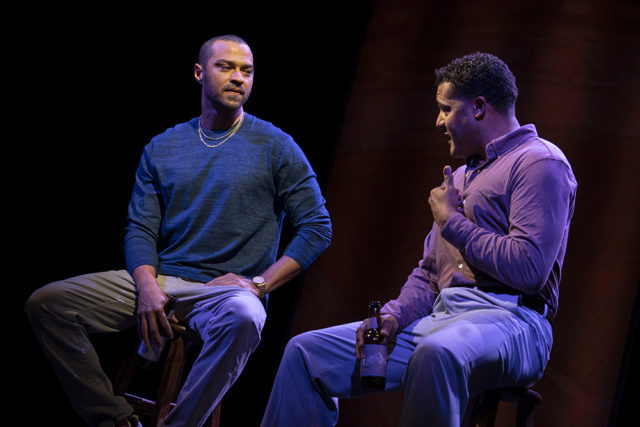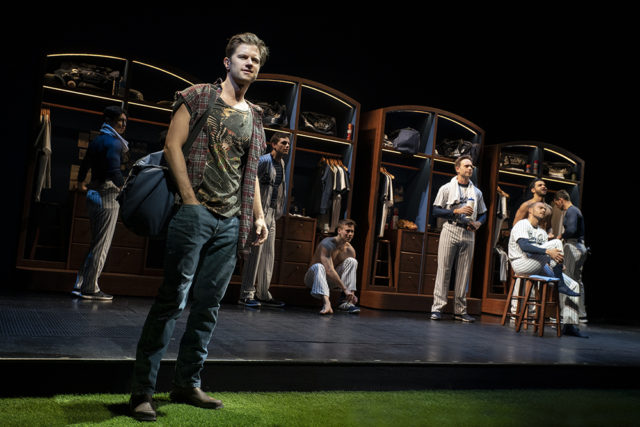
Much of Take Me Out happens in the locker room — with and without uniforms (photo by Joan Marcus)
TAKE ME OUT
Helen Hayes Theater
240 West 44th St.
Tuesday – Sunday through June 11, $79-$199
2st.com/shows
Scott Ellis’s hit Broadway revival of Richard Greenberg’s Tony-winning Take Me Out is well on its way to the playoffs (Tony nominations) and the World Series (Tony wins), but you don’t have to know anything about baseball to root for this compelling tale of ego, homophobia, and winning and losing.
It all starts with the brilliant title itself, which refers to: the traditional 1908 tune “Take Me Out to the Ball Game,” sung by fans during the seventh-inning stretch of every contest; a reverse riff on the chorus of John Fogerty’s 1985 hit, “Centerfield,” in which the former CCR leader declares, “Put me in, coach / I’m ready to play, today”; going out on a date; the public revelation that someone is gay; and the slang for a mob hit, as in “take him out.”
It’s 2002, and the world champion Empires, a stand-in for the Yankees — one backdrop features a silhouette of the Yankee Stadium wooden facade — are off to another good season. The story is narrated in flashback by shortstop Kippy Sunderstrom (Patrick J. Adams), a good friend of superstar Darren Lemming (Jesse Williams), a five-tool centerfielder who comes out of the closet with a sudden, unexpected announcement that he is gay. Darren did not do it to become a role model, to fight for gay rights, or to make a sociocultural statement; throughout the play, Darren’s motivations are private, driven primarily by ego and self-importance.
“Now, I’m not a personal sort of guy, really, and that’s not gonna be any different,” Darren, a handsome mixed-race player reminiscent of Bronx Bomber legend Derek Jeter, tells his teammates. “I mean, don’t expect the free flow of information. Don’t expect the daily update. I’m just here to play ball. I’m just here to have a good time. That’s no different. . . . And if, incidentally, there’s any kid out there who’s struggling with his identity, I hope this sends a message that it’s okay. They can follow their dream, no matter what. Any young man, creed, whatever, can go out there and become a ballplayer. Or an interior decorator.”
But he also tells Kippy, “You think you know me? You think you know my secret? Shit, that wasn’t a secret — that was an omission. I’ve got a secret — but that’s not it.” Even his last name, Lemming, is a warning for others not to follow him.

Friends and rivals Darren Lemming (Jesse Williams) and Davey Battle (Brandon J. Dirden) sit down for a chat in Take Me Out (photo by Joan Marcus)
As one would expect, his declaration creates significant problems in the locker room. Emerging from the shower to find a naked Darren, Toddy Koovitz (Carl Lundstedt) complains, “So now I gotta go around worrying that every time I’m naked or dressed or whatever you’re checking out my ass.” Because, of course, every gay man immediately wants to sleep with every male he sees. But Darren always gives better than he gets, telling Toddy, “Why’re ya lookin’ at it’s the question.” As the quippy Kippy noted earlier, after Darren confirmed, “I don’t want to fuck any of you,” he responded, “It’s not about that, Darren. It’s about us wanting to fuck you.”
When their ace pitcher, Takeshi Kawabata (Julian Cihi), slumps, they call up hard-throwing closer Shane Mungitt (Michael Oberholtzer) from Double A, who leads them back on track until he opens his mouth one day and spews forth bigoted remarks that would make even former Braves reliever John Rocker wince.
The tension in the locker room grows to epic proportions as no one can have a civil conversation, exacerbated by Kawabata’s, Martinez’s (Hiram Delgado), and Rodriguez’s (Eduardo Ramos) inability to speak English, a sports trope that enrages more conservative fans who believe that if you play ball in America, you need to speak the language — and the same fans are likely to have problems with a gay player.
“We were Men,” Kippy slyly philosophizes to his teammates. “This meant we could be girlish. We could pat fannies, snap towels; hug. Now . . . What do we do with our stray homosexual impulses?” After not-too-bright new catcher Jason Chenier (Tyler Lansing Weaks) asks if he was talking specifically to him and then turns red out of embarrassment because of the topic, Kippy adds, “We’ve lost a kind of paradise. We see that we are naked.” It’s as if they have taken a bite out of that apple and are being cast out of the garden.
Meanwhile, Darren keeps meeting with his new business manager, Mason Marzac (Jesse Tyler Ferguson), a gay accountant who at first knows nothing about baseball except that Darren is also gay, which makes him fall in love with the sport and worship his client. “A couple of weeks earlier I would have barely recognized the name! Then the announcement — that incredible act of elective heroism — and it was as if I’d known him my whole life — as if he’d been something latent in my subconscious.”
As the Empires prepare for a big game against the club that Darren’s best friend, Davey Battle (Brandon J. Dirden), is on, the world around Darren and the Empires turns into a lot more than just “the mess” Kippy alluded to at the start of the show.

Shane Mungitt (Michael Oberholtzer) has a rude awakening in store in Broadway revival of Richard Greenberg play (photo by Joan Marcus)
Take Me Out is an exceptional drama that uses baseball as an apt analogy for the state of the country. “I have come (with no little excitement) to understand that baseball is a perfect metaphor for hope in a Democratic society,” Mason says. “It has to do with the rules of play. It has to do with the mode of enforcement of these rules. It has to do with certain nuances and grace notes of the game. . . . Everyone is given exactly the same chance. . . . And baseball is better than Democracy — or at least than Democracy as it’s practiced in this country — because unlike Democracy, baseball acknowledges loss.”
In the history of the four major sports leagues, only one NBA player and one NFL player have revealed they were gay and kept playing: Brooklyn Nets center Jason Paul Collins in 2013 and current LA Raiders defensive end Carl Nassib in 2021. The revelation that a baseball superstar in his prime is gay would be a major deal today, but in the twenty years since Take Me Out premiered at the Public, no MLB player and only one umpire, Dale Scott, has come out and stayed on the diamond. Greenberg’s (The Assembled Parties, Three Days of Rain, The Perplexed) play feels fresh and alive in 2022, like it could have been written yesterday, save for the lack of cellphones onstage (and, thanks to strict rules, in the audience as well).
The two-hour play (plus intermission) moves much faster and more smoothly than baseball games. Ellis (On the 20th Century, The Elephant Man) is a superb manager, guiding the actors through David Rockwell’s splendid sets, which range from the ballpark and the locker room to a lounge and actual showers. Linda Cho’s costumes, primarily baseball uniforms, spend nearly as much time off the actors as on. (The nudity is the reason audience members must have their phones sealed in a Yondr pouch that the staff will open for you during intermission and then upon exiting.)
In their Broadway debuts, Adams (Suits, Equivocation) displays an easygoing, likable charm as Kippy, earning the audience’s devoted attention from his very first words, while Williams (Grey’s Anatomy, The Sandbox) shows off his numerous tools as the secretive hotshot Darren. (He will reprise the role in an upcoming television series, according to Deadline.) Dirden (Skeleton Crew, Jitney) excels in his supporting role, like a solid, dependable DH who always gets good wood on the ball and comes through in the clutch.
But the MVP might just be Ferguson (Modern Family, The 25th Annual Putnam County Spelling Bee), who knocks it out of the park every chance he gets. Mason is the glue that holds it all together, the only one who seems to really understand Darren as both a wealthy athlete and a gay man. Ferguson’s growing enthusiasm is infectious, spreading throughout the theater; he’s just the kind of person every locker room needs.